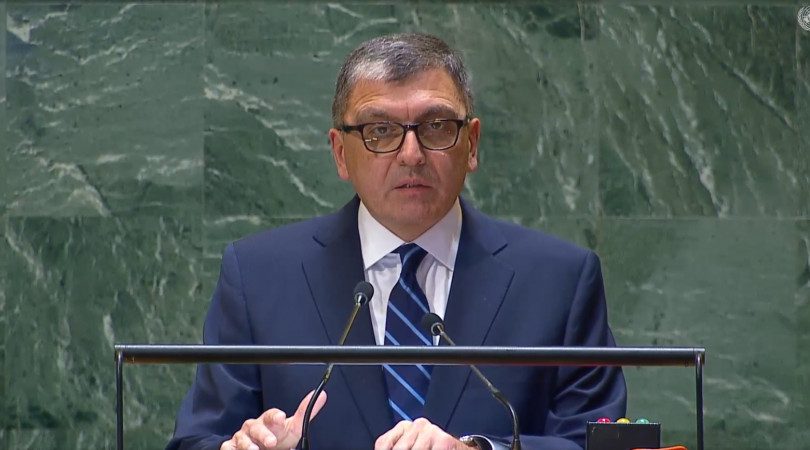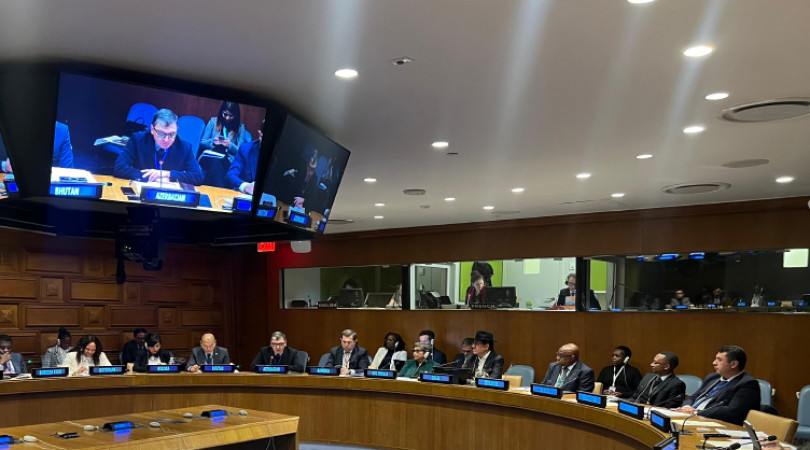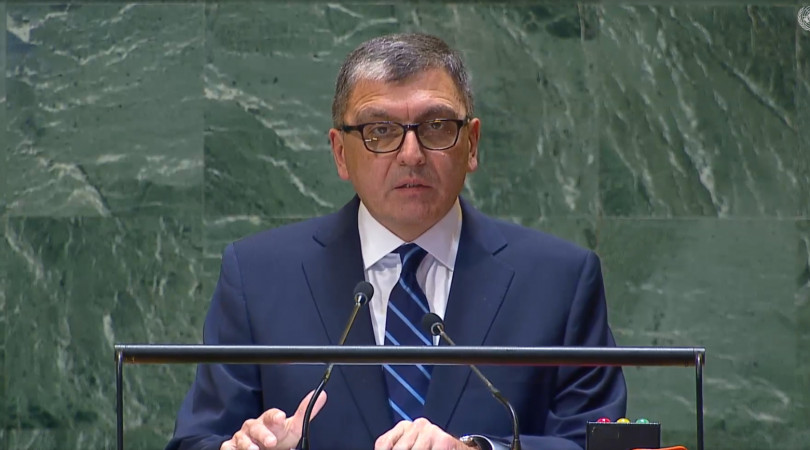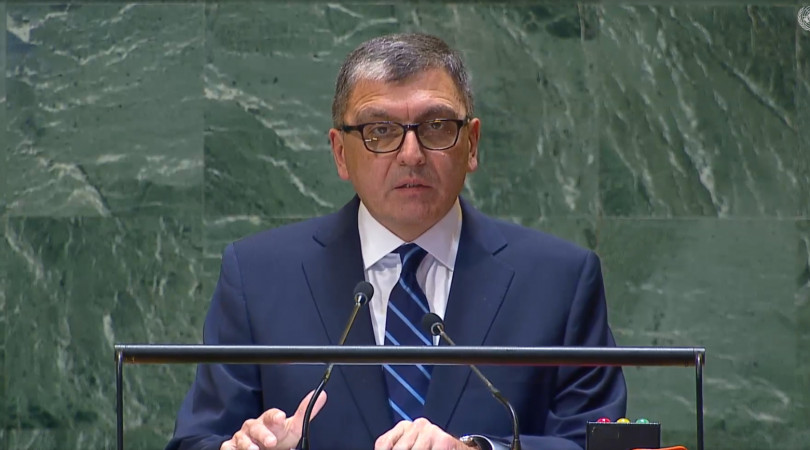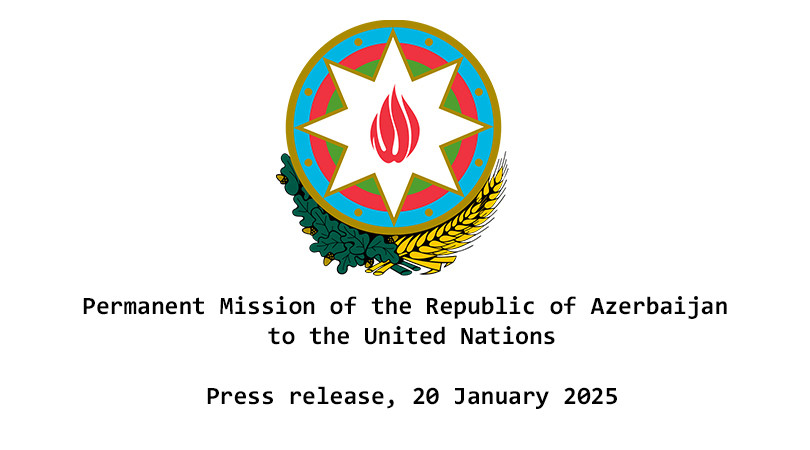Statement by the Delegation of the Republic of Azerbaijan in the exercise of the right of reply to the statement by the Delegation of the Republic of Armenia at the General Debate of the 79th session of the UN General Assembly
|
Azərbaycan Respublikasının |
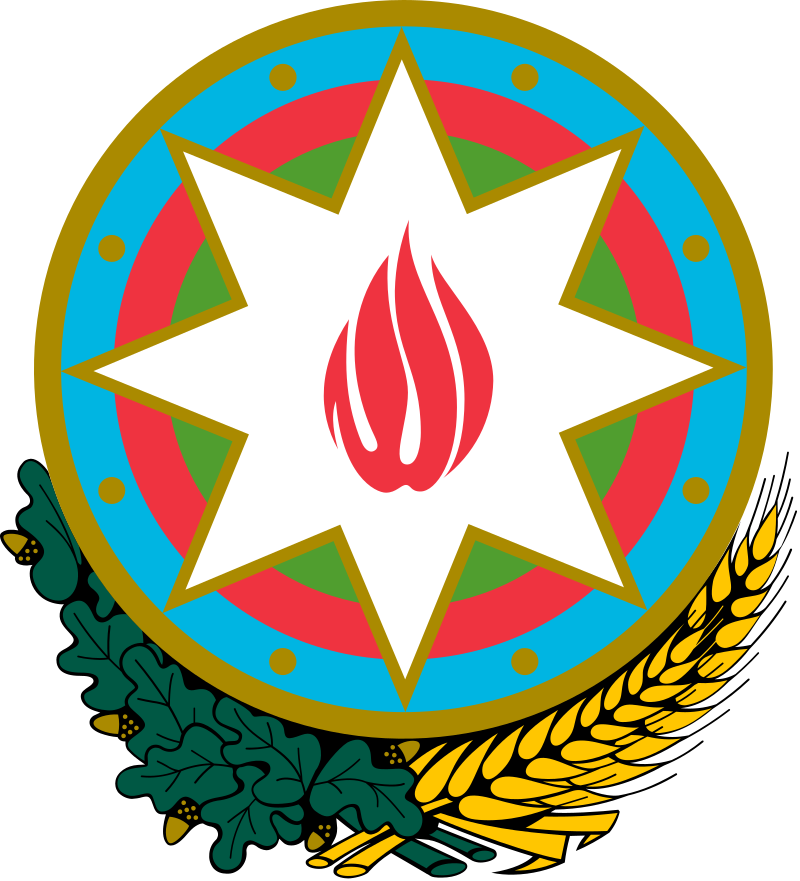 |
Permanent Mission |
|
633 Third Avenue, Suite 3210, New York, N.Y. 10017 |
||
|
Statement by the Delegation of the Republic of Azerbaijan in the exercise of the right of reply to the statement by the Delegation of the Republic of Armenia at the General Debate of the 79th session of the UN General Assembly 28 September 2024
Mr. Chairman,
In its speech at this general debate, the delegation of Armenia pointed out that the principle of mutual recognition by their country and Azerbaijan of territorial integrity and inviolability of borders is a fundamental factor for establishing peace. However, we have heard no apology from Armenia for its persistent denial of this very principle for 30 years, as a result of which tens of thousands of people lost their lives, the genocide in Khojaly and numerous other atrocities were committed against the Azerbaijani civilians, more than a million Azerbaijanis were expelled from their homes and deprived of their property, and thousands of cities, towns and villages in my country, not in Armenia, were plundered and razed to the ground. It is ironic to hear accusations from Armenia, which violated every norm and principle of international law and whose agenda throughout the past conflict was to rid the formerly occupied territories of Azerbaijan of their Azerbaijani inhabitants by force, to prevent their return and to replace them with ethnic Armenians, thereby seeking to colonize these territories by changing their demography and character. The international community condemned these actions, qualifying them as amounting to ethnic cleansing and a “scorched earth policy”. The counteroffensive operation and the local counter-terrorism measures carried out by Azerbaijan in the fall of 2020 and in September last year, respectively, put an end to the unlawful occupation of its territories and ensured the restoration of my country’s sovereignty and territorial integrity. Azerbaijan fought not against a fictitious entity or civilian residents, as Armenia falsely claims, but against the regular armed forces of Armenia, as well as terrorist and mercenary groups under its command and control, deployed in the then-occupied territories of Azerbaijan. The common in all actions that Azerbaijan was compelled to take in response to Armenia’s repeated unlawful use of force was their compliance with international law, the U.N. Charter and the relevant resolutions of the Security Council. As to the residents who decided to migrate to Armenia and other countries, it was their choice, although Azerbaijan, by all available means, encouraged them to stay. If Armenia is genuinely interested in finding out the reasons of this, then it should look for the roots in its notorious doctrine of ethnic incompatibility, which it sought to impose as a model for our peoples to live next to each other, but not together. Set against the claims made by the representative of Armenia, the United Nations inter-agency mission that visited the region refuted the allegations that the local residents and their property were targeted during the security measures or thereafter. Another false assertion is that Azerbaijan holds “Armenian hostages”. There are no “Armenian hostages” in Azerbaijan, while those held accountable for war crimes, terrorist activity and other serious offences committed during the conflict do not enjoy such status by definition. These measures are fully consistent with the legislation and international obligations of Azerbaijan. Armenia’s feigned concern for cultural property is easily exposed by numerous facts of destruction, desecration and appropriation of Azerbaijani cultural heritage both in Armenia itself and in the territories of Azerbaijan when they were under occupation. Armenia’s allegations about Azerbaijan’s territorial claims against Armenia are equally groundless, as they totally ignore the simple fact that, despite the ruinous consequences of the aggression, occupation and mass atrocities endured by the people of my country, it was Azerbaijan that extended the hand of peace and initiated the process of normalizing relations with Armenia based on mutual recognition and respect for each other’s sovereignty and territorial integrity. It is due to Azerbaijan’s determined and consistent efforts that significant progress has been made in the bilateral negotiations on the draft peace agreement and the delimitation of the border between the two States over the past four years. The return of Azerbaijanis to their historical homeland in Armenia is a human right, not a territorial claim. Mr. Chairman, With the end of the conflict, the historic opportunity has emerged for the long-awaited peace and security in our region. However, the challenges remain. During this high-level week, we have once again witnessed Armenia’s refusal to take practical steps at the national level to root out territorial claims from a number of its legal and political acts and especially from its Constitution, which laid the basis for the sustained denial of the principle of the inviolability of borders and ultimately underpinned the aggression against Azerbaijan in the past and which constitute the main obstacle to the normalization of relations today. While the delegation of Armenia is of the view that there are no territorial claims against Azerbaijan in their Constitution, the same Constitution, however, proclaims that the declaration of independence of Armenia, which is based on the earlier act of annexation of part of the territory of Azerbaijan, enshrines the fundamental principles of the Armenian statehood and the nation-wide objectives. If this is not a territorial claim, then what is it? Consequently, what Armenia is required to do as the main prerequisite for signing a viable and sustainable peace agreement is to bring its rhetoric about territorial integrity and inviolability of borders in conformity with genuine respect for these principles in its policies, practice and laws, including, in the first place, by prior modification of its Constitution. The unacceptable comments just made by the delegation of Armenia, along with the ongoing anti-Azerbaijan smear campaign, including through some third countries, pseudo-experts, lobbyists, diaspora and NGOs aligned with shared xenophobic aspirations, clearly contradict Armenia’s statements about its interest in creating an environment conducive to moving the peace process forward. Therefore, Armenia must demonstrate not only in words, but mainly in real deeds that it is genuinely committed to international law and the peace agenda. Peace is indeed within reach. However, for this to happen, there is a pressing need to address the remaining issues responsibly and to legally ensure that a return to the past of irredentism and aggression is excluded forever.
Thank you. |
||

